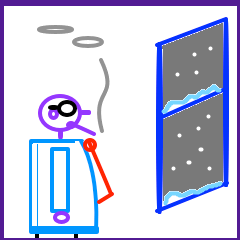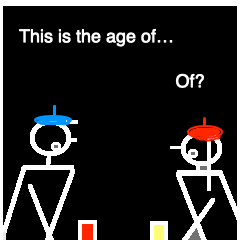The bartender came over.
"Would you two lovebirds care for another round?"
"What?" said Miss Alcott, who had been gazing at the minstrel band, her head swaying with the music.
"Another round, Lou?"
"Oh, yes, Bret," she said, "another one of these delicious Amontillados for me and a fresh tankard of sarsaparilla for my friend Milford.
"You got it, babe," said Bret the bartender.
"And it's on my tab."
"No!" said Milford. "Please, Miss Alcott, let me –"
"Nonsense," said Miss Alcott. "You are my guest, and I won't hear of it."
The bartender took Miss Alcott's empty glass and Milford's tankard and went away, and Miss Alcott swiveled on her stool to face Milford.
"I wonder would you care to dance, good sir?"
"Um, uh –"
"Look at Emily and Harriet out there tripping the light fantastic."
On the small dance floor, among a group of other dancers dressed in old-fashioned clothes, Emily and Harriet were lifting their skirts and kicking their legs to the sprightly music. Dancing with them, or at any rate near them, was Nathaniel Hawthorne, seemingly impersonating an excited chicken.
"Um," said Milford.
"Doesn't it look like fun?" said Miss Alcott. "They're dancing the Black Bottom. Do you know that dance?"
"I don't think so."
"A most delightful Negro dance. I could show you how to do it."
"I don't think so."
"You don't think I can show you how? Oh, but I assure you I can, and will, and shall."
"Here ya go, Lou," said the bartender, laying down a pony glass of golden liquid in front of Miss Alcott, and a metal tankard in front of Milford.
"Thank you so much, Bret," said Lou. "And now, Milford, take a quick quaff of your sarsaparilla and let us cut a rug, sir!"
"Okay, Miss Alcott," said Milford, "two things. One, I don't dance."
"Nonsense. Everyone can dance. Everyone with legs, anyway."
"I would humbly disagree, but here's the other thing."
"Oh, yes, you said two things."
Miss Alcott had been smoking a cigarette, and now she stubbed it out in the cut-glass ashtray on the bar between them.
"This is very difficult for me to say," said Milford.
"Out with it, lad."
"I have become possessed of another erection."
Miss Alcott looked downward at Milford's inguinal area, over which he was holding the front tails of his peacoat.
"Are you sure?" she said.
"Yes, I am afraid so," said Milford. "I'm trying to hide it under my peacoat, as you see."
She lifted her glass and took a sip of the golden liquid.
"I had not known that I was so physically alluring," she said. "Either that or you are a most virile young man!"
"I think it's those mushrooms I ate," said Milford.
"Oh, yes, the mushrooms."
"They are affecting me in the strangest ways."
"So you don't think you'd be able to dance?"
"I'm not even sure I could stand upright."
"What you must do is try to think of something else."
"I'm trying, but it's difficult."
"Didn't you say that some little man in the Pointers room advised you to think of your mother, and that doing so deflated your tumescence?"
"Oh, right."
"So, think about her again. Think about your mother."
"I've lived my whole life trying not to think about my mother."
"But it's for a good cause. Look, tell me about this mysterious mother of yours. Tell me about the good Mrs. Milford."
"She is a harpy. Or should I say a harridan?"
"Those are harsh words, dear Milford."
"You don't know her. She has always treated me as if I were a complete disappointment to her."
"And have you been a complete disappointment to her?"
"Yes. But still."
"Still what?"
"No one likes to be despised by his own mother."
"But have you tried not to be a disappointment to her?"
"No."
"Why not?"
"Because I want to be myself."
"Which is what?"
"A fool," said Milford.
"And why do you want to be a fool?"
"I don't want to be a fool, but that's what I am."
"And yet you still want to be yourself."
"Yes. I realize it's a quandary. But, you see, someday I hope not to be a fool."
"A noble ambition."
"Oh."
"Oh what?"
"My erection. It has subsided."
"Oh, good. Does this mean we can dance now?"
"I'm afraid not. I may be a fool, Miss Alcott, but I choose not to be a dancing fool. However, if you wish to dance without me, please, do so."
"No, I think I would rather sit here and continue to plumb your depths."
"That shouldn't take very long," said Milford.
"Are you saying you have no depths to plumb?"
"I'm saying my depths are more like a puddle than an ocean. An inch deep at best."
"I have rarely met a man so self-deprecatory."
"I am only trying to be honest."
"Trying?"
"And probably failing."
Milford suddenly realized that he hadn't smoked a cigarette in a half hour or more, he whose one consistent pleasure in life was to smoke, and who spent most of his waking hours with a lighted cigarette either in his lips or in his fingers,
so much so that when he had gone for his draft physical the Selective Service doctor had dismissed him after only the most cursory soundings of his narrow chest, awarding him the precious status of 4-F, and so who was to say that smoking was bad for your health? Was it worse for your health than getting shot at? Milford thought not!
At any rate he fished out his pack of Husky Boys and his lighter, and, if nothing else, having been raised a gentleman, he offered the pack to Miss Alcott.
"Husky Boys," she said. "Are they as good as Lucky Strikes?"
"You're asking the wrong person," he said. "For me cigarettes started as an affectation but have become, more or less, my raison d'être. Taste and flavor are the least of my considerations, and I've never yet had a cigarette I didn't like."
"And are Husky Boys your cigarette of choice?"
"No, I usually smoke this English brand called Woodbines,
because I saw Dylan Thomas smoking them at a poetry reading and I wanted to be like him, but then this evening the poet Wallace Stevens pointed out to me that I was being pretentious, and told me to smoke American cigarettes. And so tonight I chose Husky Boys at random from the cigarette machine."
"You lead a very interesting life, don't you?"
"Only if you're interested in case studies of terminal neurosis."
"Ha ha. Very well, I shall try one of your Husky Boys!"
She took a cigarette in her delicate fingers, and like a gentleman Milford lighted her cigarette and then his own.
The minstrel band was playing the opening bars of a new number now, "Camptown Races", or was it "Polly Wolly Doodle" or something else?
"You have still not told me of your hopes and your dreams," said Miss Alcott.
"I hope to be a great poet," said Milford. "And this is also my dream. However, one great and seemingly insurmountable obstacle stands in my way."
"And pray what is that, dear boy?" asked Miss Alcott.
"A complete and utter lack of talent," said Milford.
"Oh, my dear, dear boy," said Miss Alcott. "My dearest idealistic but, oh, so naïve boy. Look around you." She waved her cigarette at the people at the tables, on the dance floor, and sitting at the bar. "Look at Mr. Longfellow there, at Mistress Bradstreet, at Mr. Poe, at Mr. Whittier and the two young Messrs. Crane! Where would any of them be if they let a minor detail like a lack of talent stand in their way?"
Milford almost failed to hear what the lady was saying, so absorbed was he in enjoying his first cigarette in what seemed like a lifetime, but then the import of her words stormed the gates of the embattled fortress of his brain.
He coughed before speaking, his usual smoker's cough, nothing to be alarmed about, at least not yet.
"Do you mean to say," he said, "that there is hope for me still?"
"Yes," said Miss Alcott. "The unwritten great poems are out there, in the ether if you will, waiting only to be born into this world. You must only allow yourself to receive them."
"But," said Milford.
"Yes?"
"How do I allow myself to receive these poems?"
"You sit down with a pen, and paper, you let your mind go blank, or, failing that, let it wander hither and fro, and you wait."
"That's all?"
"That is all."
"And how long must I wait?"
"Perhaps a lifetime."
"So there's no guarantee."
"Of course not. It's sheerly a matter of luck."
Milford took another drag of his Husky Boy.
Tomorrow he would ask Maria the maid to make him an especially strong pot of coffee and bring it to his room. He would fill his fountain pen (the handsome black and gold Montblanc that T.S. Eliot himself had given him) and put a blank sheet of foolscap on the blotter of his small desk in front of the leaded window looking out onto Bleecker Street.
He would wait.
He would hope to get lucky.
The singer of the band was singing now.
If you have no daughters,
give them to your sons.
one a penny, two a penny,
hot cross buns!



















































